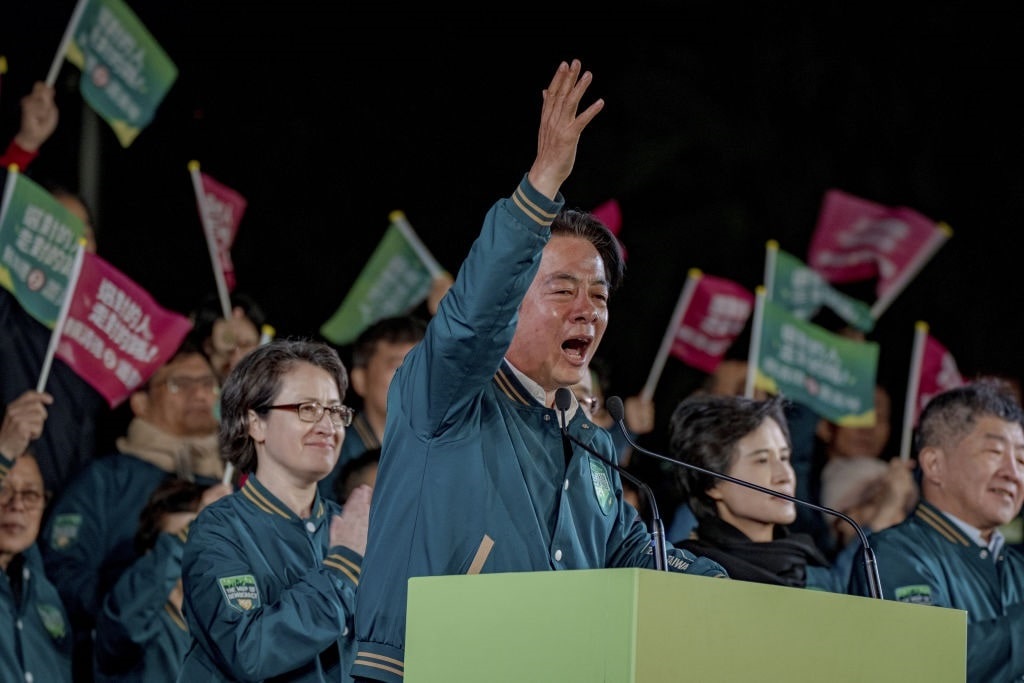Three parties vie for control in Taiwan – but this election is ultimately about China.
How the Taiwanese vote in their national election on January 13 could have lasting consequences in US-China-Taiwan relations. In recent months, the People’s Liberation Army (PLA) of China has stepped up its aggressive operations against Taiwan, attempting to scare the voters into selecting a candidate favorable to the island re-unifying with the mainland. However, actively threatening the Taipei government just as easily could persuade the Taiwan voters to choose a president inclined to exercise greater independence in its relationship with Beijing.
Taiwan’s selection of a new leader takes place against a backdrop of aggression by its neighbor, mainland China. Despite persistent incursions into its airspace by the PLA Air Force and threatening operations in the Strait of Taiwan and around the island by the PLA Navy becoming routine, Taiwan has not been cowed. Beijing sees this election as significant in determining the future relationship between the People’s Republic of China (PRC) and the self-governing, democratic Taiwan. Three political parties are vying for leadership and key legislative positions.
Taiwan Election Choice Is Really About China

Lai Ching-te (Photo by Man Hei Leung/Anadolu via Getty Images)
The Democratic Progressive Party (DPP) holds incumbency with President Tsai Ing-wen, who is term-limited and will turn over leadership to the winner of the election. China does not want the DPP candidate, Taiwan’s Vice President Lai Ching-te, to be the next president. Lai has consistently advocated for a more independent Taiwan identity, prompting strong PRC opposition. Challenging the DPP is the Kuomintang (KMT) party candidate, Hou Yu-ih, mayor of New Taipei City. Hou is seen as more moderate in his views, believing the best way to modify China’s belligerent behavior is through closer diplomatic contact.
A third party has gotten some modest traction with Taiwan’s younger voters. The Taiwan People’s Party (TPP) has put forward Ko Wen-je, a former mayor of Taipei, as its candidate. The TPP is viewed as attempting to walk the fine line between the DPP and the KMT party candidates. Ko also sees reaching out to the PRC to be more collegial as the best way to relieve tensions. However, the former Taipei mayor has not polled as strongly as the two front-runners. When polling on the election stopped on January 2, DPP candidate Lai was leading the other candidates, according to BBC reporting.
China has been determined to influence the election in favor of the KMT candidate, as Beijing sees Hou as easier to persuade to go along with PRC policies in the region. Additionally, China is Taiwan’s largest customer for goods, particularly semiconductors and microelectronics. Consequently, balancing the threat of the PLA re-unifying Taiwan with the mainland by force and maintaining cordial trade relationships is and will continue to be the major challenge for whoever is elected president. The more extreme messaging has characterized the political battle between the DPP and the KMT as a choice between war and peace: A vote for the DPP will get Taiwan more conflict with the PRC, whereas putting the KMT in office will bring peace across the Taiwan Strait.
The PRC is not making the election easy. In addition to the constant aggressive military behavior, the Chinese Communist Party (CCP) engaged in election interference on a grand scale. “Floating high-altitude balloons over the island, funding pro-Beijing social media influencers, and hosting local officials on lavish trips to China: These are among the tactics Beijing is accused of deploying to influence Taiwan’s presidential election to be held on Saturday,” an influential Washington, DC, news outlet reported recently. Other, less subtle attempts to influence the election outcome are also in play.
China’s Aggression Adds Stress to the Election
The frighteningly frequent incursions into Taiwan’s airspace and territorial waters is designed to frighten the Taiwanese into believing the PRC is on the brink of invading and can do so whenever it wants. Beijing intends these actions to persuade Taiwan voters to elect a party more willing to accommodate the CCP designs on the island government. Additionally, China recently launched a rocket carrying a satellite over Taiwan.
Though the satellite was carrying scientific equipment, the launch was initially thought to be a missile, which prompted an air raid alarm across the island. “While the rocket launch sparked an erroneous air raid alarm, Taiwan, which China views as its territory over the strong objections of the government in Taipei, has repeatedly accused Beijing of trying to interfere in the vote, whether via military, political, economic or other means,” Reuters explained.
US ties to Taiwan are a thorn in China’s side and have more recently been the cause of animosity between the two nations. Consequently, the election’s outcome is important to US interests in the region. “A Lai victory could also worsen friction between China and the US over Washington’s support for Taiwan…That would strain the fragile easing of bilateral tensions that President Joe Biden and China’s leader Xi Jinping brokered,” Phelim Kine reported for Politico.
Whether the election portends the direction of US-China relations or lays the groundwork for a PRC invasion of democratic Taiwan, Washington will be watching the outcome with great interest. In any case, a strong inclination for self-rule and sovereign self-determination will be Taipei’s struggle against the darkness of becoming another Hong Kong.
The views expressed are those of the author and not of any other affiliation.

